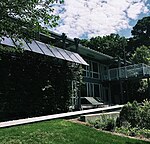Nasher Museum of Art
2005 establishments in North CarolinaArt museums and galleries in North CarolinaArt museums established in 2005Buildings and structures completed in 2005Duke University campus ... and 7 more
Institutions accredited by the American Alliance of MuseumsMesoamerican art museums in the United StatesModernist architecture in North CarolinaMuseums in Durham, North CarolinaPre-Columbian art museums in the United StatesRafael Viñoly buildingsUniversity museums in North Carolina

The Nasher Museum of Art (previously the Duke University Museum of Art) is the art museum of Duke University, and is located on Duke's campus in Durham, North Carolina, United States.
Excerpt from the Wikipedia article Nasher Museum of Art (License: CC BY-SA 3.0, Authors, Images).Nasher Museum of Art
Campus Drive, Durham
Geographical coordinates (GPS) Address Phone number Website External links Nearby Places Show on map
Geographical coordinates (GPS)
| Latitude | Longitude |
|---|---|
| N 35.999063888889 ° | E -78.929052777778 ° |
Address
Nasher Museum of Art
Campus Drive 2001
27705 Durham
North Carolina, United States
Open on Google Maps







